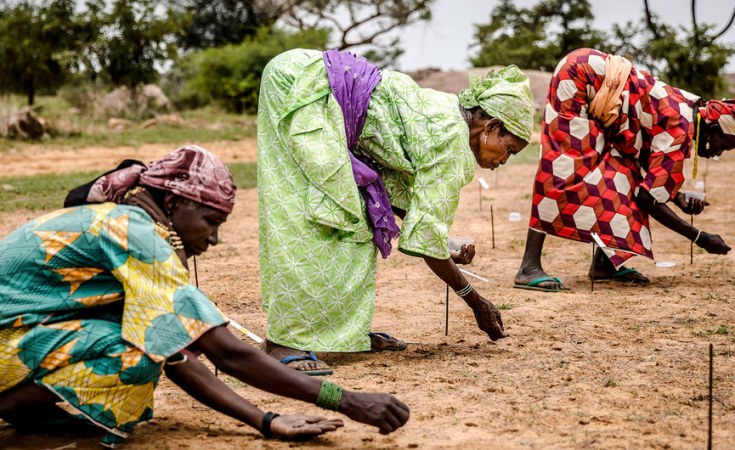While the rich history of Women’s Day goes back to 1909 with civic action by working women in the streets of New York and was highlighted in 1911 across several European cities, it was not until 1967 that the United Nations firmly dedicated 8 March as the International Women’s Day.
This year’s theme, “Women in leadership: Achieving an equal future in a COVID-19 world” recognises the place of women in the pandemic fight. For the women and girls in the Sahel and the wider West and Central African region, the month of March in which the women’s day is celebrated remains special. It comes under the backdrop of a distressing Covid-19 pandemic and a regional conflict that has led to the rise in extremism and a humanitarian crunch in the Sahel.
The 2021 theme has a strong resonance with the women in the Sahel. Still nursing the wounds of the 2014-2015 Ebola outbreak, handling humanitarian crises in the Sahel, combating obstetric fistula cases, and now confronting the Covid-19 pandemic are four key milestones illuminating the resilience of the Sahelian women. They steadfastly spearhead initiatives meant to alleviate humanitarian suffering, protect vulnerable women, adolescents, and children alongside the promotion and protection of the fabrics that weave strong communities and the core strands that ascertain sound family health.
Within the Sahel, women continue to stand out in the fight to contain Covid-19. They form the majority cluster working as frontline health personnel countering the pandemic as doctors, nurses, caregivers, community mobilisers, and even innovators providing tangible homegrown sustainable solutions, coordinating humanitarian assistance, and offering family support. With the recent news of renewed cases of Ebola Viral Disease (EVD) in Guinea and the Democratic Republic of Congo, the same template of women leading from the front amidst all the risks involved is at play.
Facing an unprecedented pandemic accompanied by multiple challenges of shouldering the heavy burden of humanitarian emergencies in the region is a demonstration of the Sahelian women’s indefatigable spirit and her resilience. They stand alert, unbowed, have refused to be subdued, and remain resolutely vigilant in their quest for a just, healthy, peaceful, and prosperous future for all.
A good case study of the inventiveness of the women in this part of the world is the one ably demonstrated by the Sahel Women’s Empowerment and Demographic Dividend (SWEDD). It was launched in 2015 and involves nine countries, namely Benin, Burkina Faso, Cameroon, Chad, Côte d'Ivoire, Guinea, Mali, Mauritania, and Niger. SWEDD, which is coordinated by the UNFPA and supported by the World Bank, promotes easier and affordable access to quality family health services. This initiative has led to a marked improvement in women’s average incomes and significantly reduced the number of child marriages. Within the SWEDD countries, 102,600 girls who did not attend school or out-of-school girls got a second chance thanks to the setting up of 3,420 SWEDD “safe spaces.” The high school completion rate for girls increased from 35.1 percent to 40.3 percent between 2015 and 2018. The education of girls continues to remain a priority,
These are not all.
In phase one, it helped to train thousands of midwives and nurses across the implementing countries. Between 2015 and 2018, the number of midwives and nurses in the SWEDD countries increased from 31,043 to 35,775, and another 100 general health workers were trained. These successes came in handy during the pandemic as the trained medics were deployed to lead response teams, facilitate health clusters and intensify preventive and even curative services alongside public awareness at the grassroots. Having noted the intrinsic value of the SWEDD model, it will scale-up as more countries join the noble initiative.
As we formalize our strategies and measures to build back better, it is incumbent upon us to accommodate women at all levels. Covid-19 has solidified the credentials of our women, illustrated the boldness of their resolve, and highlighted the integrity informing the core values they possess in uplifting and safeguarding our collective interests in health, peace, security, and development in the Sahel.
Going forward as the world embraces drastic post-pandemic recovery measures it is vital to recognize the resilient Sahelian women, acknowledge the role they have played, appreciate the strides they have made, salute the progress achieved and accept them as equal partners in development.
The lessons learned from Covid-19 pandemic implore us to scale up investments and shore up women-friendly financial packages; bolster equality at all levels; shatter all discriminative practices and legal statutes that bar women’s empowerment and accommodate them as equals in the “build back better” strategy.
We begin 2021 with a renewed determination to drastically reduce the number of victims of obstetric fistula in the region. We are launching the regional strategy to eliminate fistula and restore the dignity of fistula patients, by leveraging broad-based partnerships.
Mabingue Ngom is the Regional Director of the UNFPA-West and Central African Regional Office. He oversees 23 countries.


